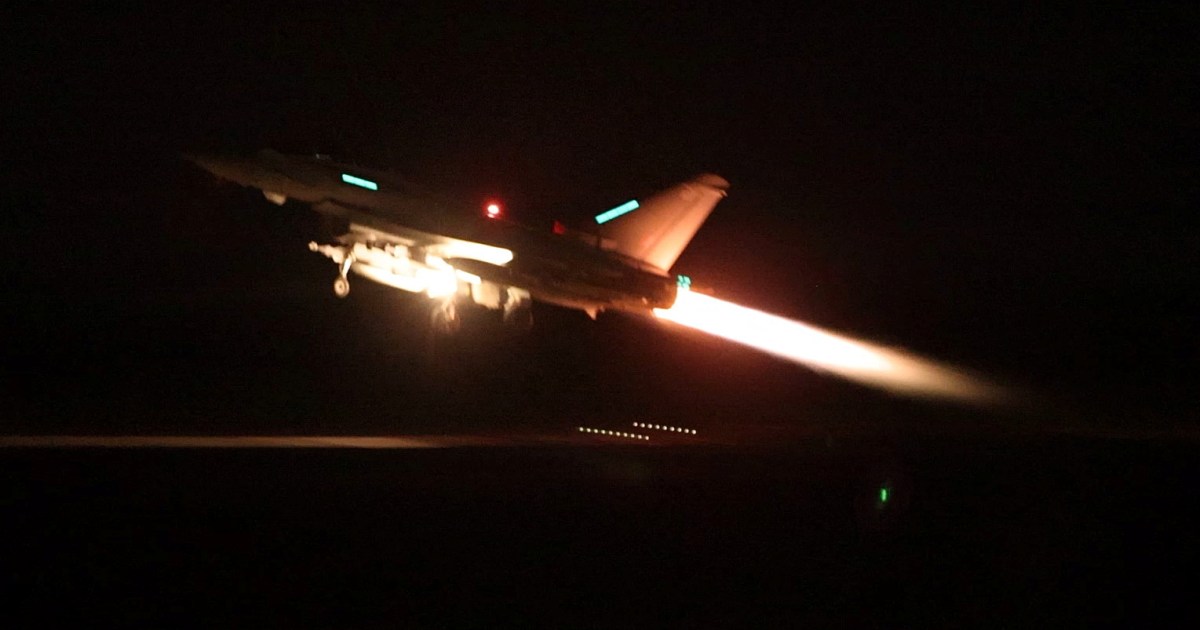
The United States and Britain have launched military strikes in Yemen against the Iran-aligned Houthi rebels in response to the group’s attacks on shipping in the Red Sea, raising fears of an escalation of conflict in the region.
US President Joe Biden warned on Thursday that he would “not hesitate” to take further action if necessary and that the strikes followed “unprecedented” attacks by the Houthis on commercial ships in the Red Sea.
“These targeted strikes are a clear message that the United States and our partners will not tolerate attacks on our personnel or allow hostile actors to imperil freedom of navigation,” Biden said.
Calling the attacks on Yemen “barbaric”, the Houthis said on Friday that there was no justification for them and that the group will continue targeting ships heading towards Israel.
Yahya Saree, the group’s military spokesperson, said 73 strikes hit five regions of Yemen under their control, killing five people and wounding six. He did not elaborate on who was killed.
“The American and British enemy bears full responsibility for its criminal aggression against our Yemeni people, and it will not go unanswered and unpunished,” Saree warned.
Mohammed Abdul-Salam, the Houthis’ chief negotiator and spokesperson, described the US and Britain as having “committed foolishness with this treacherous aggression”.
“They were wrong if they thought that they would deter Yemen from supporting Palestine and Gaza,” he wrote online. The group’s “targeting will continue to affect Israeli ships or those heading to the ports of occupied Palestine,” he wrote.
Al Masirah, a Houthi-run satellite news channel, reported that the strikes hit the al-Dailami air base north of the capital, Sanaa, the airport in the strategic port city of Hodeidah, a camp east of Saada, the airport in the city of Taiz and an airport near Hajjah.
The strikes are the first on Yemeni territory since 2016 and also marked the first military intervention by the US in reaction to drone and missile attacks on commercial ships since Israel’s war on Gaza started in October.
The Houthi movement, which controls much of Yemen after nearly a decade of war against a Western-backed and Saudi-led coalition, is a strong supporter of Hamas in its war against Israel.
The Palestinian group said that the US and the United Kingdom will bear responsibility for the impact of the strikes on the security of the region.
The Houthis have attacked commercial ships they say are linked to Israel or bound for Israeli ports and have engaged directly with the US Navy in the Red Sea, firing ballistic missiles and deploying armed drones against US and UK warships.
British Prime Minister Rishi Sunak said the strikes were “necessary and proportionate”.
Britain’s defence ministry said in a statement that “early indications are that the Houthis’ ability to threaten merchant shipping has taken a blow”.
Giorgio Cafiero, CEO of Gulf State Analytics, a Washington, DC-based geopolitical risk consultancy, said the US had options other than a military attack.
“One of them was to use the leverage that Washington has over Israel to push Israel into abiding by a ceasefire [in Gaza],” Cafiero told Al Jazeera, adding that “the Biden administration, for political reasons, has chosen not to do that”.
“This has the potential to drag the US into a protracted conflict in the Middle East,” he said. “”I think the decisions that the Biden team is making are pushing us in this very dangerous direction right now.”
The US said Australia, Bahrain, Canada and the Netherlands supported the operation, and presented the strikes as part of an international effort to restore the free flow of trade in a key route between Europe and Asia that accounts for about 15 percent of the world’s shipping traffic.
Iran, which supports the Houthis, condemned the attacks, and Russia said it had requested an urgent meeting of the United Nations Security Council to discuss the military strikes.
Saudi Arabia called for restraint and “avoiding escalation”.
Earlier this month, a group of countries led by the US warned the Houthi of “consequences” unless they stopped their “illegal attacks” on shipping and released “unlawfully detained vessels and crews”.
A joint statement on Thursday from the US, Britain, Australia, Bahrain, Canada, Denmark, Germany, Netherlands, New Zealand and South Korea said the “aim remains to de-escalate tensions and restore stability in the Red Sea”.
“But let our message be clear: we will not hesitate to defend lives and protect the free flow of commerce in one of the world’s most critical waterways in the face of continued threats,” it said.
https://news.google.com/rss/articles/CBMiYGh0dHBzOi8vd3d3LmFsamF6ZWVyYS5jb20vbmV3cy8yMDI0LzEvMTIvdXMtYW5kLXVrLWxhdW5jaC1zdHJpa2VzLWFnYWluc3QtaG91dGhpLXJlYmVscy1pbi15ZW1lbtIBZGh0dHBzOi8vd3d3LmFsamF6ZWVyYS5jb20vYW1wL25ld3MvMjAyNC8xLzEyL3VzLWFuZC11ay1sYXVuY2gtc3RyaWtlcy1hZ2FpbnN0LWhvdXRoaS1yZWJlbHMtaW4teWVtZW4?oc=5
2024-01-12 08:25:30Z
Tidak ada komentar:
Posting Komentar